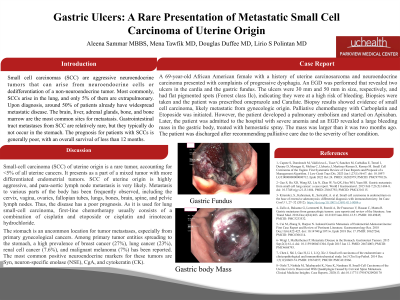Sunday Poster Session
Category: Stomach
P1685 - Gastric Ulcers: A Rare Presentation of Metastatic Small Cell Carcinoma of Uterine Origin
Sunday, October 27, 2024
3:30 PM - 7:00 PM ET
Location: Exhibit Hall E

Has Audio

Aleena Sammar, MBBS
Parkview Medical Center
Pueblo, CO
Presenting Author(s)
Aleena Sammar, MBBS, Mena Tawfik, MD, Douglas Duffee, MD, Lirio S. Polinton, MD
Parkview Medical Center, Pueblo, CO
Introduction: Small cell carcinomas (SCC) are aggressive neuroendocrine tumors. Most commonly, SCCs arise in the lung, only 5% of them are extrapulmonary. Upon diagnosis, around 50% of patients already have widespread metastatic disease. The brain, liver, adrenal glands, bone, and bone marrow are common sites for metastasis. Gastrointestinal tract metastases from SCC are relatively rare, but they typically do not occur in the stomach. The prognosis for patients with SCCs is generally poor, with an overall survival of less than 12 months
Case Description/Methods: A 69-year-old African American female with a history of uterine carcinosarcoma and neuroendocrine carcinoma presented with complaints of progressive dysphagia. An EGD was performed that revealed two ulcers in the cardia and the gastric fundus. The ulcers were 30 mm and 50 mm in size, respectively, and had flat pigmented spots (Forrest class IIc), indicating they were at a high risk of bleeding. Biopsies were taken and the patient was prescribed omeprazole and Carafate. Biopsy results showed evidence of small cell carcinoma, likely metastatic from gynecologic origin. Palliative chemotherapy with Carboplatin and Etoposide was initiated. However, the patient developed a pulmonary embolism and started on Apixaban. Later, the patient was admitted to the hospital with severe anemia and an EGD revealed a large bleeding mass in the gastric body, treated with hemostatic spray. The mass was larger than it was two months ago. The patient was discharged after recommending palliative care due to the severity of her condition.
Discussion: Small-cell carcinoma (SCC) of uterine origin is a rare, aggressive tumor, accounting for < 5% of uterine cancers. It presents as a part of a mixed tumor with more differentiated endometrial tumors. Metastasis to various parts of the body has been frequently observed, including the cervix, vagina, ovaries, fallopian tubes, lungs, bones, brain, spine, and pelvic lymph nodes. The disease has a poor prognosis.The stomach is an uncommon site for tumor metastases from primary gynecological cancers. Among primary tumors spreading to the stomach, a high prevalence of breast cancer (27%), lung cancer (23%), renal cell cancer (7.6%), and malignant melanoma (7%) has been reported. The most common positive neuroendocrine markers for these tumors are Syn, neuron-specific enolase, CgA, and cytokeratin. As for lung SCC, first-line chemotherapy usually consists of a combination of cisplatin and etoposide or cisplatin and irinotecan hydrochloride.
Disclosures:
Aleena Sammar, MBBS, Mena Tawfik, MD, Douglas Duffee, MD, Lirio S. Polinton, MD. P1685 - Gastric Ulcers: A Rare Presentation of Metastatic Small Cell Carcinoma of Uterine Origin, ACG 2024 Annual Scientific Meeting Abstracts. Philadelphia, PA: American College of Gastroenterology.
Parkview Medical Center, Pueblo, CO
Introduction: Small cell carcinomas (SCC) are aggressive neuroendocrine tumors. Most commonly, SCCs arise in the lung, only 5% of them are extrapulmonary. Upon diagnosis, around 50% of patients already have widespread metastatic disease. The brain, liver, adrenal glands, bone, and bone marrow are common sites for metastasis. Gastrointestinal tract metastases from SCC are relatively rare, but they typically do not occur in the stomach. The prognosis for patients with SCCs is generally poor, with an overall survival of less than 12 months
Case Description/Methods: A 69-year-old African American female with a history of uterine carcinosarcoma and neuroendocrine carcinoma presented with complaints of progressive dysphagia. An EGD was performed that revealed two ulcers in the cardia and the gastric fundus. The ulcers were 30 mm and 50 mm in size, respectively, and had flat pigmented spots (Forrest class IIc), indicating they were at a high risk of bleeding. Biopsies were taken and the patient was prescribed omeprazole and Carafate. Biopsy results showed evidence of small cell carcinoma, likely metastatic from gynecologic origin. Palliative chemotherapy with Carboplatin and Etoposide was initiated. However, the patient developed a pulmonary embolism and started on Apixaban. Later, the patient was admitted to the hospital with severe anemia and an EGD revealed a large bleeding mass in the gastric body, treated with hemostatic spray. The mass was larger than it was two months ago. The patient was discharged after recommending palliative care due to the severity of her condition.
Discussion: Small-cell carcinoma (SCC) of uterine origin is a rare, aggressive tumor, accounting for < 5% of uterine cancers. It presents as a part of a mixed tumor with more differentiated endometrial tumors. Metastasis to various parts of the body has been frequently observed, including the cervix, vagina, ovaries, fallopian tubes, lungs, bones, brain, spine, and pelvic lymph nodes. The disease has a poor prognosis.The stomach is an uncommon site for tumor metastases from primary gynecological cancers. Among primary tumors spreading to the stomach, a high prevalence of breast cancer (27%), lung cancer (23%), renal cell cancer (7.6%), and malignant melanoma (7%) has been reported. The most common positive neuroendocrine markers for these tumors are Syn, neuron-specific enolase, CgA, and cytokeratin. As for lung SCC, first-line chemotherapy usually consists of a combination of cisplatin and etoposide or cisplatin and irinotecan hydrochloride.
Disclosures:
Aleena Sammar indicated no relevant financial relationships.
Mena Tawfik indicated no relevant financial relationships.
Douglas Duffee indicated no relevant financial relationships.
Lirio Polinton indicated no relevant financial relationships.
Aleena Sammar, MBBS, Mena Tawfik, MD, Douglas Duffee, MD, Lirio S. Polinton, MD. P1685 - Gastric Ulcers: A Rare Presentation of Metastatic Small Cell Carcinoma of Uterine Origin, ACG 2024 Annual Scientific Meeting Abstracts. Philadelphia, PA: American College of Gastroenterology.
